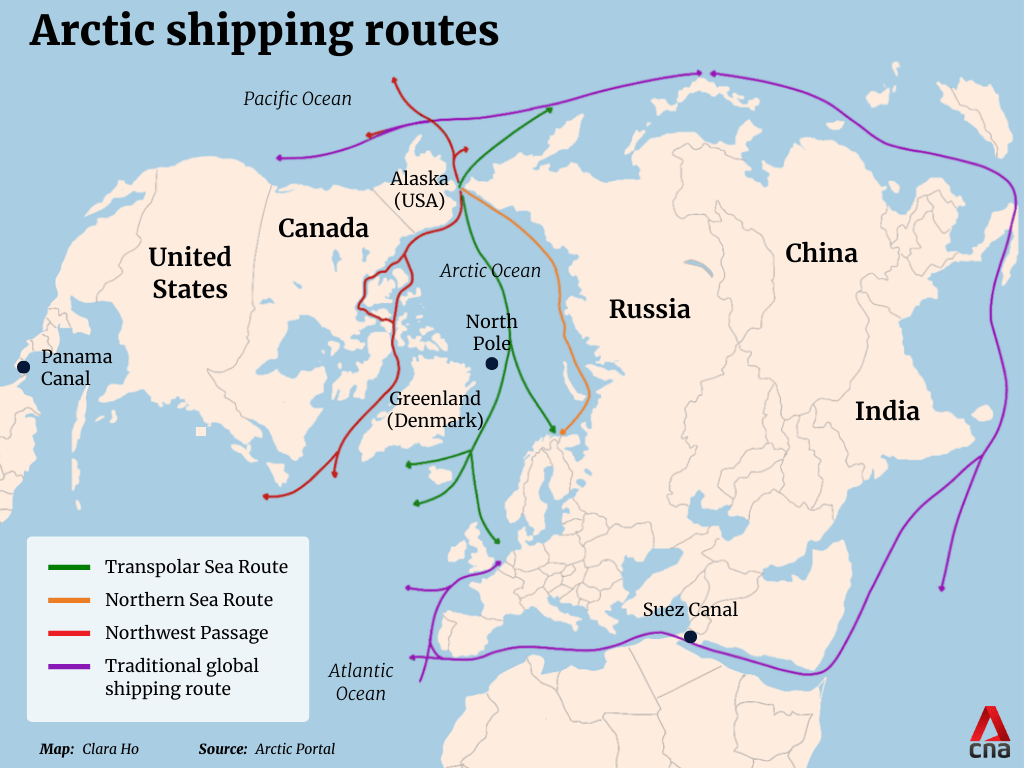Commentary: US push to buy Greenland could create an opening for China
Beijing’s ambitions in the Arctic are real, but its influence in Greenland is limited. That might change if Washington pushes too hard, say Neil Thomas and Haolan Wang from the Asia Society Policy Institute.


This audio is generated by an AI tool.
NEW YORK: Now that United States President Donald Trump is making good on some campaign pledges, like sweeping tariffs levied against Canada, Mexico and China, the question is whether he will follow through on other ideas. How far might he take his desire to buy Greenland?
Mr Trump cites China as a justification for acquiring this autonomous territory of Denmark. And his insistence - to the point that a recent phone call with the Danish prime minister was described as “horrendous” - has raised eyebrows in Beijing, where officials and scholars are trying to decipher what Mr Trump wants and what it means for China.
“We need it for international security,” he said on his first day in office. “You have Russian boats all over the place, you have China’s boats all over the place - warships.”
Beijing’s ambitions in the Arctic are real. China brands itself a “near-Arctic state”.
The country has been pursuing regional partnerships through a “Polar Silk Road” plan to create faster shipping routes and research projects that could have dual-use applications (for both civilian and military purposes). Greenland’s vast reserves of rare earth minerals - critical for high-tech industries from electric vehicles to missile systems - could make it an attractive target for Chinese investment.

CHINA’S SYMBOLIC FOOTPRINT
But China’s actual footprint in Greenland is more symbolic than substantial, for now. Once-promising investments have fizzled due to financial problems and political pushback.
In recent years, the Danish government has revoked the mining license of a Chinese firm for non-operation and successfully opposed a Chinese state-owned enterprise’s bid to build airports in Greenland. Just last month, the Swedish National China Centre declared that "China has already quit Greenland".
Greenland is now firmly in the Western camp when it comes to US-China strategic competition.
The US is Greenland’s largest source of foreign direct investment, the European Union is its primary trade partner, and it runs a significant trade surplus with China. Washington has a distinct military edge over China through its Pituffik Space Base on the island’s northwest coast, under a defence agreement with Denmark.
Beijing’s ambitions to open Arctic trading routes now focus on the Russian side of the Arctic Sea, suggesting China’s Arctic shipping traffic may not concentrate around Greenland.
A DISTRACTION OR NEGOTIATING TACTIC?
China’s official response to Mr Trump’s Greenland remarks has been muted, reflecting the wait-and-see approach that President Xi Jinping has adopted more broadly with the new administration.
However, on Chinese social media, the idea has been met with humour, with some netizens joking that China should make a counteroffer for Alaska, and curiosity, as others pondered whether a Greenland invasion could give Beijing the opportunity to “reunify” with Taiwan.
The most interesting reactions are coming from Chinese scholars and commentators. Many doubted the feasibility of Mr Trump’s plan, seeing it as an offhand distraction or a negotiating tactic for more economic concessions from Denmark rather than a serious policy proposal.
Others view his proposal as reckless, with the potential of upending the geopolitical stability and economic prosperity of the entire global order.
A wildcard scenario would involve China lending rhetorical or diplomatic support for Mr Trump’s Greenland ambitions in exchange for the US relaxing its commitment to defend Taiwan. Yet this conjecture is dubious, not only because Beijing already considers Taiwan part of its sovereign territory and not up for trade, but also because it overestimates Mr Trump’s ability to single-handedly overturn US strategic posture.
POSITIONING CHINA AS A MORE RELIABLE PARTNER
Greenland is unlikely to become a flashpoint in US-China relations, but Mr Trump’s brash approach could still have unintended consequences.
If the US pressures Denmark too aggressively, it could push Copenhagen and other European capitals closer to other partners, including China.
Despite their internal disagreements, European leaders have already closed ranks on preserving the territorial integrity of Denmark and fending off the threat of tariffs on the European Union.
European Commission President Ursula von der Leyen, a key proponent of de-risking the bloc’s economic ties with China, has signalled more openness to “engage constructively” with Beijing in what she says is a new era of “hyper-transactional geopolitics”.
In a recent poll, Greenlanders overwhelmingly opposed the idea of becoming part of the US. It will hold a general election on Mar 11, with its independence aspirations and its relations with Denmark and the US expected to be the top campaign issues.
This scepticism of Mr Trump’s overtures could even give China an opening to revive its economic and diplomatic projects with the territory and further expand its Arctic strategy.
If the US is reprioritising Greenland's importance for national security, its interests would be best served by strengthening diplomatic, economic and security ties. Improving relations with the Greenlandic government would help build US presence on the island and ensure that Washington is the dominant influence in the region, countering Chinese ambitions in the North American Arctic.
China will monitor Mr Trump’s Greenland gambit with a mixture of bemusement and strategic calculation. For Beijing, this issue confirms its priors about the fickleness of US foreign policy and will be seen as an opportunity to promote itself as a more reliable partner to governments in the Arctic, Europe and beyond.
Neil Thomas is a Fellow on Chinese Politics at the Asia Society Policy Institute’s Center for China Analysis. Haolan Wang is a Research Assistant at the same organisation.





















